Find the biggest stories from across the soccer world by visiting our Top Soccer News section and subscribing to push notifications.
The Champions League quarterfinals kicked off this week. Below, we dissect the biggest talking points from each of the first-leg matches.
Madrid, Man City roll with the punches
There was nothing tactical about Tuesday’s utterly decadent prize fight between Real Madrid and Manchester City. There were goals of extremely high quality, turnovers leading to counterattacks, and momentum swings that likely made Pep Guardiola ill. Few managers crave control as much as he does, but no matter how much his team had the ball, it couldn’t have possibly legislated against the madness Madrid rained on their opponents.
These two teams dropped their gloves and took their licks in a slugfest that fed off the atmosphere that throbbed under the Bernabeu’s new roof. Bernardo Silva’s second-minute sucker punch – a clever free-kick that caught Madrid goalkeeper Andriy Lunin sleeping – elicited a strong response from Los Blancos. Just like that, Madrid were up 2-1. But City struck back with two quick-trigger goals of their own. Federico Valverde’s line drive of a volley completed an epic goal rush.
The game somehow finished 3-3 despite producing a measly 1.58 expected goals. On paper, it made no sense. Analysts could try to tell you that City’s high line failed without Kyle Walker or that positioning Rodrygo on the left was a tactical masterclass. Such analysis would be overly academic. It would seek logic from the desperation on display in Madrid.
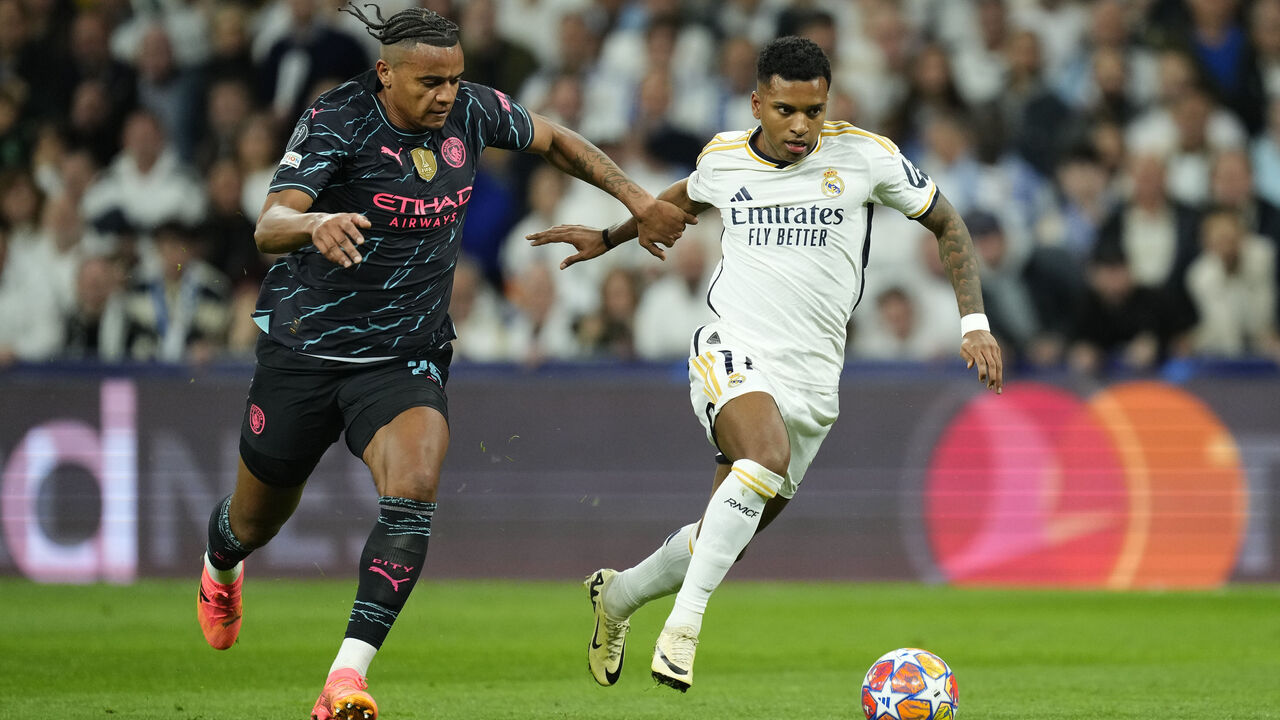
Too much is made about how teams prepare for matches and not enough about how they react. The fact is that neither team would’ve preferred a game like this one; neither side would’ve wanted to concede three times. Instead, we saw 22 players solving problems in real time, without relying on the schematics they may have studied beforehand. Silva took advantage of a gap that presented itself in Madrid’s wall, and Josko Gvardiol let an absolute cannon of a shot rip from distance with his weaker right foot. Madrid simply started gunning for goal when they went down early and benefited from two deflections. It was survival of the fittest.
“I really don’t think that conceding so early affected us or our mentality, at all,” Madrid boss Carlo Ancelotti said afterward.
That’s because Madrid are almost always ready to duke it out when games go off the rails. They can improvise no matter what the situation. They’ve won Champions League titles without being the best team in Europe. It’s something Manchester City have learned as well. They can still have success when they lose possession 25 times. They have enough belief in themselves when the system fails. Guardiola’s tactics aren’t infallible, and he’ll admit it. It’s why he always gives his players so much credit.
“In the first one, two, three seasons together, we would have lost 4-1, 5-1,” Guardiola said, according to Agence France-Presse. “We were not stable emotionally. Being stable emotionally is fundamental … in the good moments and the bad moments.”
They deserve praise here. For large stretches, it looked like City would just pass their way into dead ends, doing little with a lot. But as the apparatus wobbled, Foden and Gvardiol produced bits of individual brilliance – and they escaped with a lifeline.
Arsenal shoot themselves in the foot
There was a lot to unpack after Tuesday’s absorbing 2-2 draw between Arsenal and Bayern Munich.
Bukayo Saka thought he should have been awarded a penalty in the dying seconds of the match after contact inside the area with an onrushing Manuel Neuer. Thomas Tuchel was incensed that Bayern weren’t given a spot-kick of their own following a bizarre handball incident stemming from an Arsenal goal kick. Harry Kane could maybe count himself fortunate he wasn’t sent off for a wicked elbow on Gabriel Magalhaes that looks increasingly deliberate each time you watch it. For those who enjoy a spirited argument about contentious refereeing decisions, this was a feast.
Ultimately, those calls – or non-calls – were supplementary to the script written at the Emirates. Arsenal’s uncharacteristic errors held them back against a wounded, wobbly Bayern side in turmoil. Mikel Arteta’s team is the best defensive unit in Europe this season, conceding the fewest expected goals of any club in the top five leagues. That solidity, the backbone of their recent success and sustained title push, abandoned them at the worst possible time.
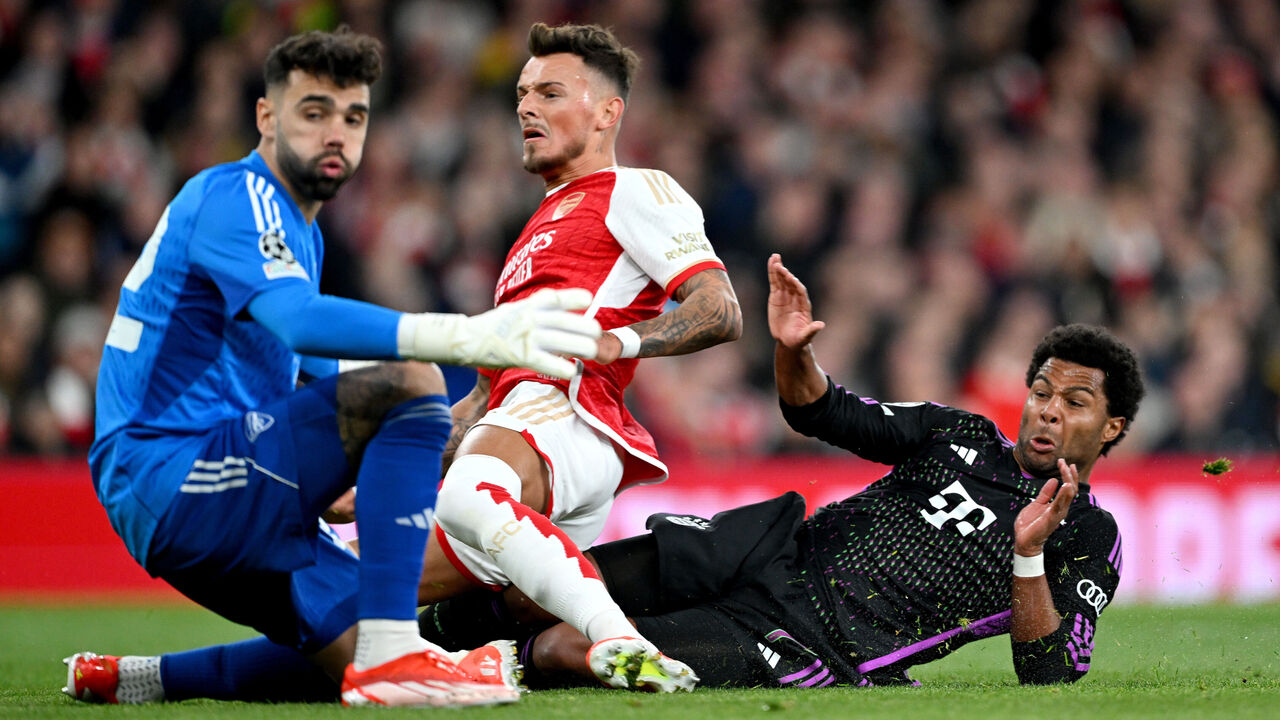
David Raya’s inexplicable decision to race off his line for no apparent reason directly contributed to Serge Gnabry’s totally avoidable goal. But it must be said that a flummoxed Gabriel then compounded the issue by misplacing the simplest of passes. The incident that led to Kane’s successful penalty was a comedy of defensive mishaps. Leroy Sane beat four players on his own before being felled in the box; Jakub Kiwior was dispatched with ease near the touchline; Jorginho huffed and puffed but never had a chance to catch the rapid German and make a recovery tackle; Gabriel pulled out of a challenge and ended up on his backside; William Saliba, almost infallible this season, flung out a lazy leg to concede the penalty, capping the sequence. “Yakety Sax” may as well have been playing.
Arsenal, oft-ridiculed for mishaps during their recent lean years, have largely eliminated those types of sloppy mistakes as they’ve catapulted back to being one of Europe’s elite teams. Arteta is confident his side, now more mature and resilient, will learn from the first leg and “be better in certain areas” in next week’s return fixture in Munich.
Tuesday was a missed opportunity, but if the Gunners deliver a clean performance free of self-imposed blunders at the Allianz Arena, that should be enough to bring them a memorable result and a place in the final four.
Barcelona expose PSG’s problem areas
It seems that a lot of Raphinha’s time at Barcelona has been sullied by media speculating on how to offload or replace him. There were rumors that the winger was available as recently as the January transfer window, with Manchester United and a Saudi Pro League club reportedly among the interested parties, while he struggled to consistently find the back of the net despite his unquestionable work ethic and relentless shooting.
After some steady improvement to his output since mid-December, Raphinha and his club will hope his brace and overall performance in Wednesday’s 3-2 win at Paris Saint-Germain marks the true turning point for his time in Catalonia. The most pleasing of his strikes was his second goal when Pedri – after being introduced from the bench seconds earlier – took one touch before lofting a perfectly weighted pass over the PSG backline. Rather than lash at his volley, Raphinha simply and smartly guided the ball into the bottom corner.
Raphinha at the Parc des Princes
| Stat | Number | Team rank |
|---|---|---|
| Shots on target | 4 | 1st |
| Total shots | 6 | 1st |
| Completed dribbles | 2 | Joint 1st |
| Dispossessed | 0 | Joint 1st |
| Key passes | 3 | 2nd |
Yet, it must be said that Paris Saint-Germain were vulnerable. Marquinhos moved from center-back to right-back to deputize for Achraf Hakimi, while Lucas Beraldo barked out orders from the middle of defense at just 20 years old and in his third Champions League appearance. It wasn’t ideal.
Beraldo was too keen to engage with Robert Lewandowski. His willingness to test himself against Lewandowski with a nudge under Marc-Andre ter Stegen’s punt let the ball fly over both of them in the sixth minute, forcing Gianluigi Donnarumma to charge out of his box for a crucial yet high-risk challenge on Raphinha. Beraldo was later grappling with Lewandowski six yards into Barcelona’s half, the 35-year-old slipped past him with ease, and a few seconds later, Raphinha was netting Barcelona’s opener.
Beraldo was also lucky to escape a yellow card with a late and needless challenge on Raphinha early in the opening half. In what must’ve been an effort to mask the young Brazilian’s inexperience in a game of this magnitude, Luis Enrique switched Lucas Hernandez – who started at center-back – with Marquinhos for the second half.
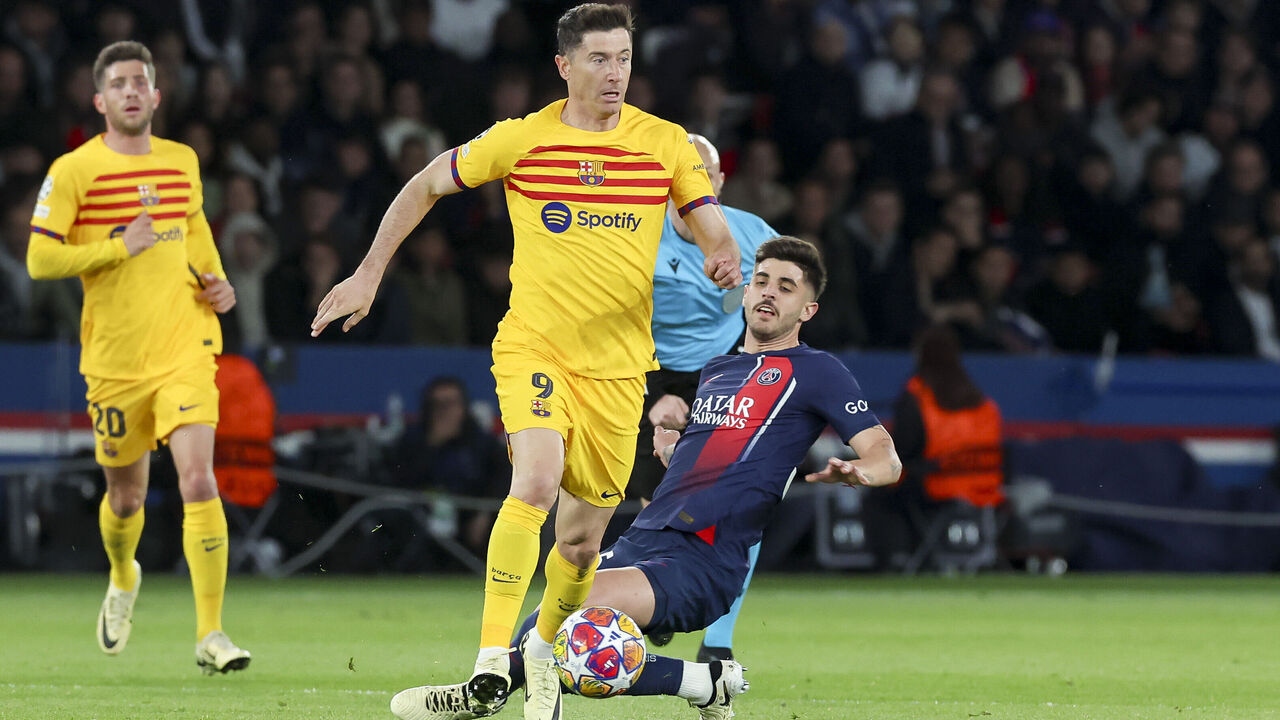
Xavi identified another one of PSG’s weaknesses, and Andreas Christensen’s 75th-minute introduction highlighted a fine evening’s work from the Barcelona boss. The visitors had clearly detected a set-piece weakness in PSG and were aggressively firing in-swinging crosses into Donnarumma’s six-yard box. The Italian goalkeeper was rattled, with one weak attempt to repel a delivery in the first half requiring a goal-line clearance from Nuno Mendes.
It was no surprise when Barcelona did it again soon after Christensen was brought on. On this occasion, Donnarumma was frozen on his line for Ilkay Gundogan’s corner. None of his defenders dealt with it. Christensen barely had to leap and was unmarked when he nodded home.
Kylian Mbappe was largely ineffectual. Out of all the problems that PSG must address ahead of next week’s reverse fixture, solving that issue would give them the biggest chance of turning around the quarterfinal tie.
Why do Atletico have to Atletico?
On the surface, it’s hard to knock Atletico Madrid. Thanks to Wednesday’s win over Borussia Dortmund, they have a 2-1 lead heading into next week’s return leg in Germany. That gives them a decent chance of making the Champions League semifinals for the first time in seven years.
And yet it doesn’t seem that way. After conceding two early goals – errors of judgment Atletico ruthlessly punished – Dortmund appear to have more control. They’re flying back to the Westfalenstadion with a manageable deficit to reverse. Sebastien Haller’s 81st-minute goal gives the Germans 50% less work to do.
Atletico didn’t exactly play like a team that’s dropped points in just four of their last 32 games at the Civitas Metropolitano. They toiled for this win and would’ve blown it had the crossbar not come to their rescue late.
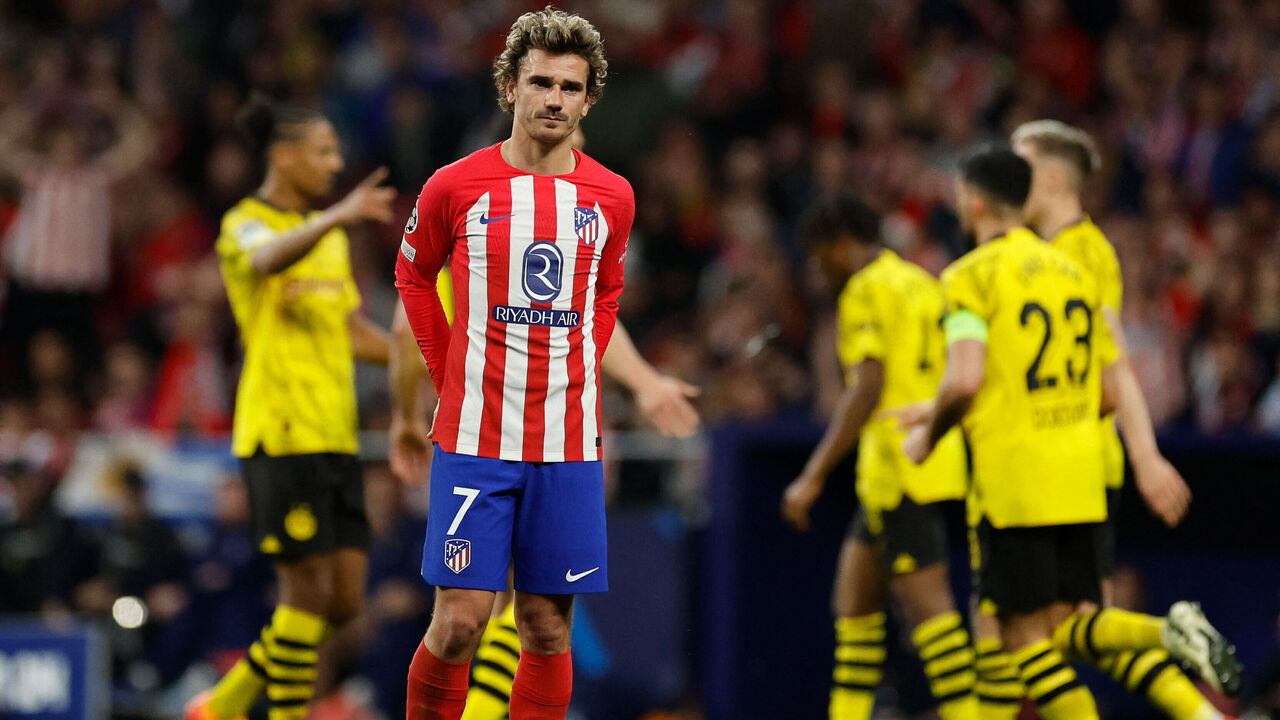
What a way to waste such a ferocious start. Over the first half-hour, Los Rojiblancos nearly strangled the visitors to the point of asphyxiation. Harried by Atletico’s unrelenting press, Mats Hummels appeared to lose consciousness a couple of times, or at least it looked that way. Dortmund struggled to play any forward passes under such vigorous pressure. The crowd cheered every time Atletico leeched onto a player in yellow. They were there every time Dortmund tried to turn with the ball.
Maybe Atletico overexerted themselves, because they backed off completely in the second half. Their back five began to set up camp. The high-energy pressing gave way to the insipid conservative tactics that many had expected Atletico – now a club with cash, talent, and pedigree – to leave behind. Diego Simeone’s side has 26 goals in 13 Champions League matches because they can finally score more than once a game. But they say old habits die hard, and Atletico looked like a team battling relegation in the last 45 minutes.
It’s telling that the game ended with Dortmund on the front foot and Julian Brandt holding his head in his hands after smacking the crossbar with a leaping header. Atletico may have won, but Dortmund played to win. They’ll carry that momentum with them and have a chance to build on it when they host the La Liga side next Tuesday in front of the Yellow Wall. And build on it they will, because as good as Atletico have been at home, they’ve been hopeless on the road, winning just four of their last 16 away games.




















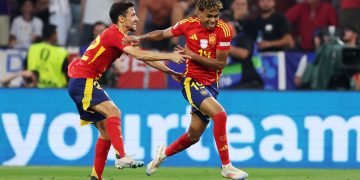
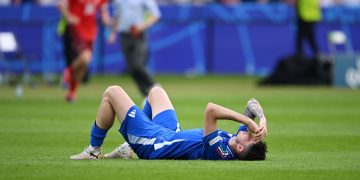
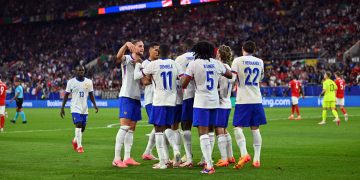

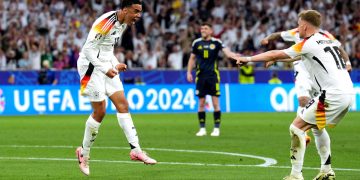
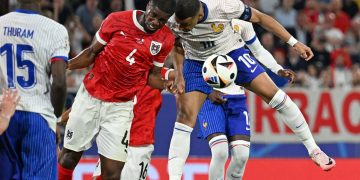




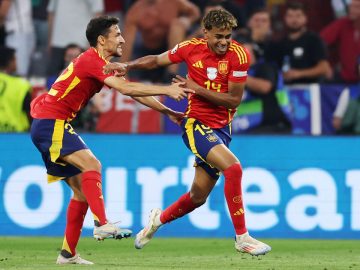

Connect with us